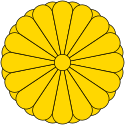| This article is part of a series on |
 |
|---|
|
|
| Country polled | Positive | Negative | Neutral | Pos − Neg |
|---|---|---|---|---|
| 3 | -53 | |||
| 25 | 3 | |||
| 18 | 18 | |||
| 42 | 18 | |||
| 38 | 28 | |||
| 39 | 29 | |||
| 19 | 31 | |||
| 19 | 33 | |||
| 5 | 35 | |||
| 18 | 36 | |||
| 20 | 36 | |||
| 37 | 37 | |||
| 26 | 40 | |||
| 12 | 42 | |||
| 5 | 53 | |||
| 15 | 55 | |||
| 5 | 61 | |||
| 11 | 65 |
The foreign relations of Japan (日本の国際関係, Nihon no kokusai kankei) are handled by the Ministry of Foreign Affairs of Japan.
Japan maintains diplomatic relations with every United Nations member state except for North Korea, in addition to UN observer states Holy See, as well as Kosovo, Cook Islands and Niue.
Japanese foreign relations had earliest beginnings in the 14th century and after their opening to the world in 1854 with the Convention of Kanagawa. Japan rapidly modernized and built a strong military. It was imperialistic seeking control of nearby areas—with major wars against China and Russia. It gained control of parts of China and Manchuria, as well as Korea and islands such as Taiwan and Okinawa. It lost in World War II and was stripped of all of its foreign conquests and possessions. See History of Japanese foreign relations. American general Douglas MacArthur, acting for the Allied powers, supervised occupied Japan 1945–51. Since occupation ended diplomatic policy has been based on close partnership with the United States and seeking trade agreements, In the Cold War, Japan was demilitarized but it allied with the U.S. in the confrontation with the Soviet Union. It played a major support role in the Korean War (1950–1953). In the rapid economic developments in the 1960s and 1970s, Japan was one of the major economic powers in the world.
By the 1990s Japan participated in the Peacekeeping operations by the UN, and sent troops to Cambodia, Mozambique, Golan Heights and the East Timor.[2] After the 9/11 terror attacks in 2001, Japanese naval vessels have been assigned to resupply duties in the Indian Ocean to the present date. The Ground Self-Defense Force also dispatched their troops to Southern Iraq for the restoration of basic infrastructures.
- ^ "2017 BBC World Service poll" (PDF). p. 20. Archived from the original (PDF) on 30 July 2017.
- ^ 国連平和維持活動(PKO) Archived 18 August 2007 at the Wayback Machine, Ministry of Foreign Affairs